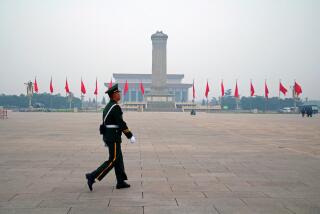China Defection Reported, Tied to U.S. Writer’s Ouster
- Share via
PEKING — China’s recent expulsion of New York Times correspondent John F. Burns may have been the result of the reported defection to the West of a high-ranking official of the Chinese Ministry of State Security earlier this year.
In July, China’s Ministry of State Security, the extremely secretive agency responsible for coordinating the nation’s counterespionage and foreign intelligence gathering, detained Burns at the Peking airport as he was about to leave China. The reporter was held in jail for six days on charges of violating travel regulations and then expelled.
At that time, there had been no public disclosure that a Chinese intelligence official had defected. This week, two foreign news agencies, Agence France-Press and Kyodo, reported that Yu Zhensan, the director of the foreign affairs office of China’s Ministry of State Security, had fled China last January during a trip to Hong Kong.
A Chinese source acknowledged this week that reports of the defection began circulating among Chinese officials about three months ago--and that, at the time Burns was detained, some officials believed this action was a response to China’s frustration over its inability to get the defector back.
“We heard a few months ago that a high-ranking official of the Ministry of State Security had defected to the U.S., that China had asked for his return and the U.S. had refused,” the source said. “China had to do something in response, or it would have been a loss of face.”
The Chinese Foreign Ministry on Wednesday turned down all requests for comment on the reported defection. “I’m not aware of that situation,” said press spokesman Li Zhaoxing. A U.S. Embassy spokesman also refused to comment.
The French news agency described Yu as a man in his late 30s, the son of two prominent revolutionaries who were persecuted by Jiang Qing, the wife of Mao Tse-tung. Yu’s father, Yu Qiwei, reportedly had been a lover of Jiang Qing’s in the early 1930’s.
The accounts of the defection said that Yu had been closely involved with a foreign woman who helped to arrange his defection in Hong Kong.
In July, Burns was stopped in China’s Shaanxi province by local officials who complained that he should not have been there without a travel permit. After two days, he was released and permitted to return to Peking. But the next week, Ministry of State Security officials detained him, saying they wanted to investigate him on suspicion of espionage. China later let him go without producing any evidence at all to substantiate the espionage allegation.
As head of the security ministry’s foreign affairs office, Yu would have been able to reveal the names and responsibilities of ranking Chinese intelligence officials. He would also have had detailed information about Chinese intelligence agents traveling overseas and about foreign intelligence officials visiting China.
More to Read
Sign up for Essential California
The most important California stories and recommendations in your inbox every morning.
You may occasionally receive promotional content from the Los Angeles Times.













